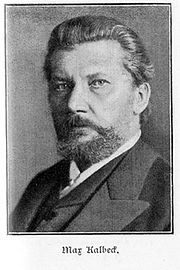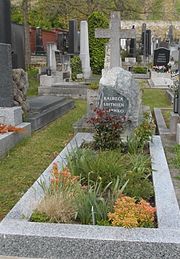Max Kalbeck
Julius Max Heinrich Kalbeck (born January 4, 1850 in Breslau , † May 4, 1921 in Vienna ) was a German music writer, music critic and translator .
Life and achievement

Max Kalbeck (he also wrote under the pseudonym "Jeremias Deutlich") became a choirboy in Breslau in 1861 under Leopold Damrosch and in 1867 a church singer . From 1860 to high school in 1869 he attended the high school of St. Maria Magdalena in his hometown. At the father's request, he then studied law in Wroclaw . During his studies in 1869 he became a member of the Arminia Breslau fraternity . In 1872 he moved to the University of Munich , where he studied philology and philosophy and studied at the royal music school in Munich with Joseph Rheinberger (composition), with Franz Wüllner (choir singing, orchestral score reading) and with Josef Walter (violin). Back in Breslau he was from 1874 first an art and music critic for the Schlesische Zeitung , then for the Breslauer Zeitung and then assistant director at the Schlesisches Museum der Bildenden Künste in Breslau. In 1880 Kalbeck came to Vienna on the recommendation of Eduard Hanslick , first as a critic for the Wiener Allgemeine Zeitung , the press (1883–1890) and from 1886 until his death for the Neue Wiener Tagblatt . He became one of the most influential critics in Austria and, like Hanslick, was a fierce opponent of the music of Richard Wagner , Anton Bruckner and Hugo Wolf , whose works were then assigned to the New German School .
On the other hand, like Hanslick, Kalbeck became a close friend and partisan of Brahms , whom he had met in 1874. His most important achievement is his extensive biography of this composer, published from 1904 to 1914 , which is still an essential music-historical source, regardless of some time-related errors and the sometimes very subjective depictions. Kalbeck also published several volumes of Brahms' correspondence, as well as the 1918 correspondence between the poets Gottfried Keller and Paul Heyse , and two collections of his own reviews.
In addition to translating opera librettos, especially those of Tchaikovsky , Verdi , Puccini and Smetana , Kalbeck wrote new librettos a. a. for Mozart's Bastien and Bastienne and La Finta Giardiniera ; he also revised those of Don Giovanni and Le Nozze di Figaro for Gustav Mahler's productions at the Vienna Court Opera . Kalbeck also contributed poems for the songs in the operetta Jabuka by Johann Strauss (son) . Two of Kalbeck's own poems were set to music by Brahms (the piano song Nachtwandler, Op. 86.3 and Last Luck, Op. 104.3 for mixed choir a cappella).
Max Kalbeck's son is the actor and director Paul Kalbeck .
In 1925, Kalbeckgasse was named after him in Vienna- Währing (18th district) .
His final resting place is in the Heiligenstädter Friedhof (part A, group 3, number 113) in Vienna.
Contemporary reception
Karl Kraus said in his satirical magazine Fackel about Kalbeck in his own way:
“He wrote a few poor lyric poems and delivered some operetta texts that were already lost again, allegedly translated foreign operas into German - Alois Obrist lists one of the most frightening examples in his essays published in Lessmann's Musikzeitung (Berlin-Charlottenburg :) on 'bad operatic German' a considerable number from Kalbeck's pen -, has dared a fearless 'adaptation' of Don Juan, has probably also enjoyed some music lessons and, since he was neither a poet nor a musician, became a newspaper critic for literature and music. As such, he joined the ranks of the Viennese Beckmesser, who differ from Wagner's only in that they often do not even know the tablature, propagated the views of his sponsor Hanslick and, in order not to miss the transition to immortality Johannes Brahms' tails in tails and seemed willing to sacrifice everything that dared to feel in tones next to this for a vengeance, a whim, a joke. Because the Wroclaw Philistine has settled in excellently in this basic Viennese mood, which a great work of art gives without hesitation for a little joke. "
Works (selection)
- The lonely lake . In: The Gazebo . 1878, p. 40 ( full text [ Wikisource ]).
- From nature and life. Poems , Breslau 1870; 2nd edition 1873 ( books.google.de )
- Wintergreen. A flower language in verse , Breslau: Gosohorsky 1872
- New seals , Breslau 1872 ( books.google.de )
- Nights. Lyrische Dichtungen , Hirschberg: Verlag der Actien-Gesellschaft »Bote aus dem Riesengebirge« 1878
- New contributions to the biography of the poet Johann Christian Günther along with an appendix containing the most important handwritten inedita of the Wroclaw City Library , ed. by Max Kalbeck. Breitkopf & Härtel, Leipzig 1879 ( Textarchiv - Internet Archive )
- At dusk. Poems , Leipzig: Breitkopf & Härtel 1881
- (Jeremiah clearly), rhyming and inconsistent. Sketches and epigrams , Berlin: Freund and Jeckel 1885
- Johannes Brahms . 4 volumes (8 half volumes), 1904–1914; Facsimile reprint Schneider / Tutzing 1976 ( digitized at Zeno.org .).
- Paul Heyse . From the story of a friendship. On Heyse's 80th birthdays (March 15, 1910) , in: Westermanns Monatshefte , vol. 54, vol. 108/1, issue 643 (April 1910), pp. 113–125 ( digitized version )
literature
- Karl Kraus : The Kalbeck case . In: Die Fackel , 9, 1904, No. 158, pp. 1–13.
- Piotr Szalsza, Romuald Kaczmarek (ed.): Max Kalbeck –- A Viennese from Breslau . Contributions to life and work, Polish / German. Atut, Wrocław, Neisse Verlag, Dresden, 2006, ISBN 978-3-934038-68-4 .
- Uwe Harten (Ed.): Max Kalbeck on the 150th birthday: Sketches of a personality . Breslau, January 4, 1850 - Vienna, May 4, 1921. Symposium Vienna, January 21–24. May 2000; Report / Tutzing 2007.
- Othmar Wessely : Kalbeck, Max. In: New German Biography (NDB). Volume 11, Duncker & Humblot, Berlin 1977, ISBN 3-428-00192-3 , p. 46 f. ( Digitized version ).
- Kalbeck, Max; Ps. Jeremias Clearly. In: Austrian Biographical Lexicon 1815–1950 (ÖBL). Volume 3, Verlag der Österreichischen Akademie der Wissenschaften, Vienna 1965, p. 187.
swell
- oeml (Austrian Music Lexicon)
- DBE (German Biographical Encyclopedia)
- Annual report 1869 of the St. Maria Magdalena grammar school in Breslau
Web links
- Literature by and about Max Kalbeck in the catalog of the German National Library
- Max Kalbeck in the Vienna History Wiki of the City of Vienna
- Short biography of Max Kalbeck. University of Graz
- Partial estate in the Bavarian State Library
Individual evidence
- ^ Helge Dvorak: Biographical Lexicon of the German Burschenschaft. Volume II: Artists. Winter, Heidelberg 2018, ISBN 978-3-8253-6813-5 , pp. 375–376.
- ^ Karl Kraus: The Kalbeck case . In: Die Fackel , 9, 1904, No. 158, pp. 1–13
| personal data | |
|---|---|
| SURNAME | Kalbeck, Max |
| ALTERNATIVE NAMES | Kalbeck, Julius Max Heinrich (full name) |
| BRIEF DESCRIPTION | German music writer, music critic and translator |
| DATE OF BIRTH | January 4, 1850 |
| PLACE OF BIRTH | Wroclaw |
| DATE OF DEATH | May 4, 1921 |
| Place of death | Vienna |

